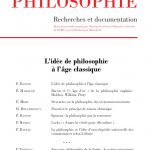 Volume 81, Issue 1, January-March 2018
Volume 81, Issue 1, January-March 2018
The Idea of Philosophy in the Classical Age

Philippe Danino, The Idea of Philosophy in the Classical Age
The object of the contributions collected here is to examine how philosophy thinks of itself at a singular moment in its history, the modern age, an age that is remarkable for its upheavals and its ruptures. Common features can be picked out from the diversity of approaches and contents given here, which make it possible to characterize this age as a crucial moment of life and of reason: that of its emancipation. Reason, the faculty of clear and distinct ideas, ascertains itself in this century as a starting-point, a sovereign power of commencement, and philosophy grasps itself not as historical or dogmatic knowledge, but as rational knowledge, the principle of which, as Hegel notes, consists of seeing, feeling, thinking for oneself, of being here oneself.
Éric Marquer, Bacon and the “Golden Age” of English Philosophy: Hobbes, Wilkins, Petty
It is possible to read the desires and ambitions of an era from the utopias it produces. This observation is particularly true for the Renaissance and early-modern Europe: utopia appears as a political alternative, in a world preoccupied with anxiety and division. But as far as the English seventeenth century is concerned, utopia gives us access to a new historical intelligibility, because it reveals the way in which a certain figure of modernity is invented through its utopias, and even asserts itself as a utopia. While Bacon, Hobbes, and Wilkins represent utopia as the sign of the inventiveness proper to philosophical discourse, it also appears, more than ever, as a discourse that society itself draws upon.
Édouard Mehl, Aristotle’s Perception of Childhood
In its historical development, Cartesian philosophy has at least three starting points: 1619 (method and mathematics); 1629-1630 (natural philosophy and the creation of the eternal truths) and 1641 (metaphysics). Each one of these three starting points is an inaugural one, although each depends on and draws on the others. Therefore, the specific shape of Cartesian philosophy lies in the proper act of restarting “a primis fundamentis,” which means that philosophy is the art of discovering the proto-subjects of thought: God, mind, and body.
Hélène Bouchilloux, Pascal: A Philosophical Explanation by Means of the Christian Principle
Should Pascal be excluded from philosophy on the basis of the argument that “To mock philosophy is to philosophize truly”? After demonstrating why reason can give itself the principle of an entire philosophy in Jesus Christ, rather than in the cogito, and why this philosophy, unlike that of Descartes, requires an order that differs from the deductive order, we will shed light on the meaning of this problematic characterization.
Philippe Danino, Spinoza: Philosophy through Encounter
To a correspondent, Spinoza states that he knows true philosophy is the one he can understand. Yet he does not, ever, define the idea of philosophy, nor does he give a table of elements of knowledge that would constitute its program or its contents. However, the ways he speaks about it and sets out its properties make up a series of hints on philosophy conceived as a praxis: that of making distinctions. But the idea of philosophy only takes on a meaning with this practice: in no way is it a preliminary, rather it generates itself within a system of encounters, i. e. by means of relations with what, a priori, is not itself (the vulgar, the ignorant, the theologian, the statesman), and that enable one, then, to recompose the nature of what Spinoza terms “true philosophy.”
Philippe Hamou, Locke: Truth for Truth’s Sake
The virtues of truth and truthfulness are significant features of Locke’s philosophical ethos. To love truth for truth’s sake, one needs to attend to the various opinions submitted to one’s judgment with perfect indifference. This epistemic “indifferency” is both the golden rule for an “ethics of belief,” stating that one should not entertain “any proposition with greater assurance than the proofs it is built upon will warrant” (Essay IV. xix. 1), and an intellectual virtue that one has to foster and cultivate through study and exercise. The last part of the paper shows how these views are illustrated in Locke’s own practice of philosophy, especially in An Essay Concerning Human Understanding.
Paul Rateau, Philosophy and the Idea of Universal Encyclopedia of Knowledge according to Leibniz
According to Leibniz, the unity and continuity of knowledge as well as its reticular structure render the divisions of philosophy arbitrary and artificial. By contrast with the traditional division of philosophy into physics, logic and ethics, Leibniz suggests different arrangements of the same truths depending on whether theoretical grounding, practical applicability or rational and easy ordering is at stake. Hence the encyclopedia, by means of which philosophy is to be expounded, forms an open and perfectible system, aimed at supporting invention, constant updating and improvement, while never losing sight of human perfection and felicity.
Pierre Thibaud, Towards a Philosophy of Limit: Peirce’s Notion of “Intermediate or Nascent State”
This notion appears in Issues of Pragmaticism (1905), in which Peirce evokes the notion of “boundary” or “limit.” The concept acquires its very meaning within the framework of a philosophy of determination and a philosophy of truth. We shall try to analyze both the underlying logic and philosophy of it, by seeking to show that therein lies perhaps, through an original philosophy of the continuum, one of the most enlightening concepts of Peirce’s pragmatism.
